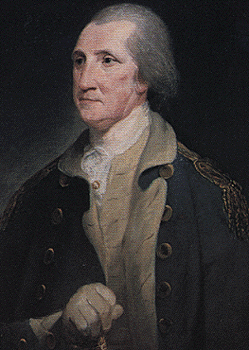When I went to India with Jerris twenty years ago, I knew there would be culture shock. I was not prepared for the intensity of it, but I knew it was coming and so I planned for it. I had three coping mechanisms: photos of my wife and daughters, the music of Gene Autry (I took cassettes), and the short stories of Mark Twain. These three connections to home made the culture shock manageable.
 George Washington kept his sanity throughout the Revolutionary War by thinking about home as well. He thought about his estate, Mount Vernon every day. Washington made only one brief visit home the entire eight years he led the army. But he spent time nearly every day managing his farm. He had left his cousin, Lund Washington, in charge as estate manager, and kept up a non-stop correspondence with him. For example - on the eve of the Battle of Brooklyn Heights Washington wrote home instructing Lund to plant an orchard. He told Lund where to plant it, how to plant it and what trees to include. It seems that little was more important to Washington than the home he had built on the Potomac.*
George Washington kept his sanity throughout the Revolutionary War by thinking about home as well. He thought about his estate, Mount Vernon every day. Washington made only one brief visit home the entire eight years he led the army. But he spent time nearly every day managing his farm. He had left his cousin, Lund Washington, in charge as estate manager, and kept up a non-stop correspondence with him. For example - on the eve of the Battle of Brooklyn Heights Washington wrote home instructing Lund to plant an orchard. He told Lund where to plant it, how to plant it and what trees to include. It seems that little was more important to Washington than the home he had built on the Potomac.*
And yet there were things more important to him – honor, his good name, and his example. On April 18, 1780, Lund posted a letter to General Washington describing how the British had come up the Potomac, stolen some slaves, destroyed a boat, and threatened to plunder Mount Vernon. Lund averted this plunder by bribing the British. He carried wine and provisions to them, and they sailed away satisfied. On April 30, General Washington posted a letter to Lund from his headquarters in Newport, Rhode Island, expressing his crushing disappointment at Lund’s behavior. He wrote:
I am very sorry to learn of your loss. I am little sorry to learn of mine. What gives me most concern is that you should go on board enemy vessels and furnish them with refreshments. It would have been a less painful circumstance for me to have heard that, in consequence of your non-compliance with their request, they had burnt my House and laid the Plantation in ruins. You ought to have considered yourself as my representative, and should have reflected on the bad example of communication with the enemy.**
He meant that. As much as he loved his home, he loved honor more. As much as he prized his well-ordered gardens, he prized his good name more. As much as he identified himself with his estate, He identified himself with his good example more.
Those are Biblical values.
A good name is more to be desired than great riches. Proverbs 22.1
Let no one look down on your youthfulness, but in speech, conduct, love, faith, and purity show yourself an example to those who believe. I Timothy 4.12
Keep your behavior honorable among the Gentiles, so that in the thing in which they slander you as evildoers, they may on account of your good deeds glorify God in the day of visitation. I Peter 2.12
The verse that comes most clearly to mind is one we used a few weeks ago when we wrote about Mr. Jefferson: Where your treasure is, there will your heart be also (Matthew 6.21). Identifying our treasure is simple enough – upon what do we spend our time, our interest, and our resources. If I apply these metrics to my life I will know, despite what I tell myself. I can say I love God best, that my family comes first, that my good example has the highest value but when I tally my time, my resources, and my funds will those expenditures agree?
God doesn’t have to do the math. He knows our hearts. I believe that we must do the math. We must assess, reflect, and change course when needed because under duress, when we are prone to react, instead of act, we will find ourselves appeasing to the enemy just as Lund did.
*Founding Gardeners (2011), by Andrea Wulf, p.14.
** All Cloudless Glory: Volume I (1995), by Harrison Clark, p.514.